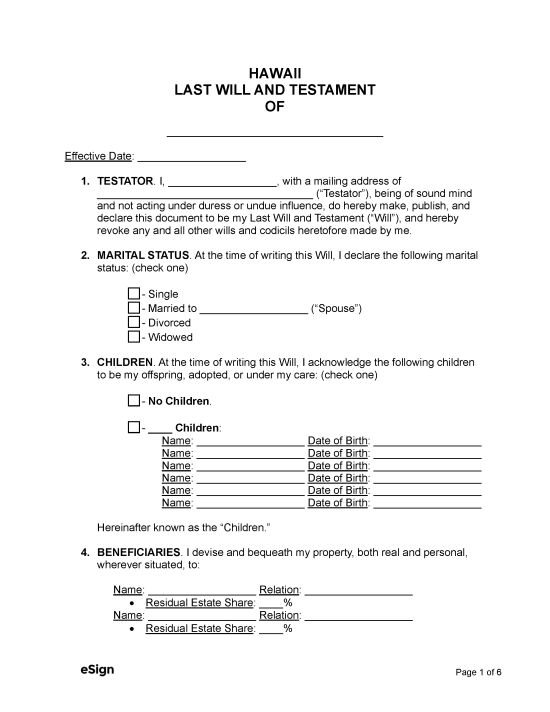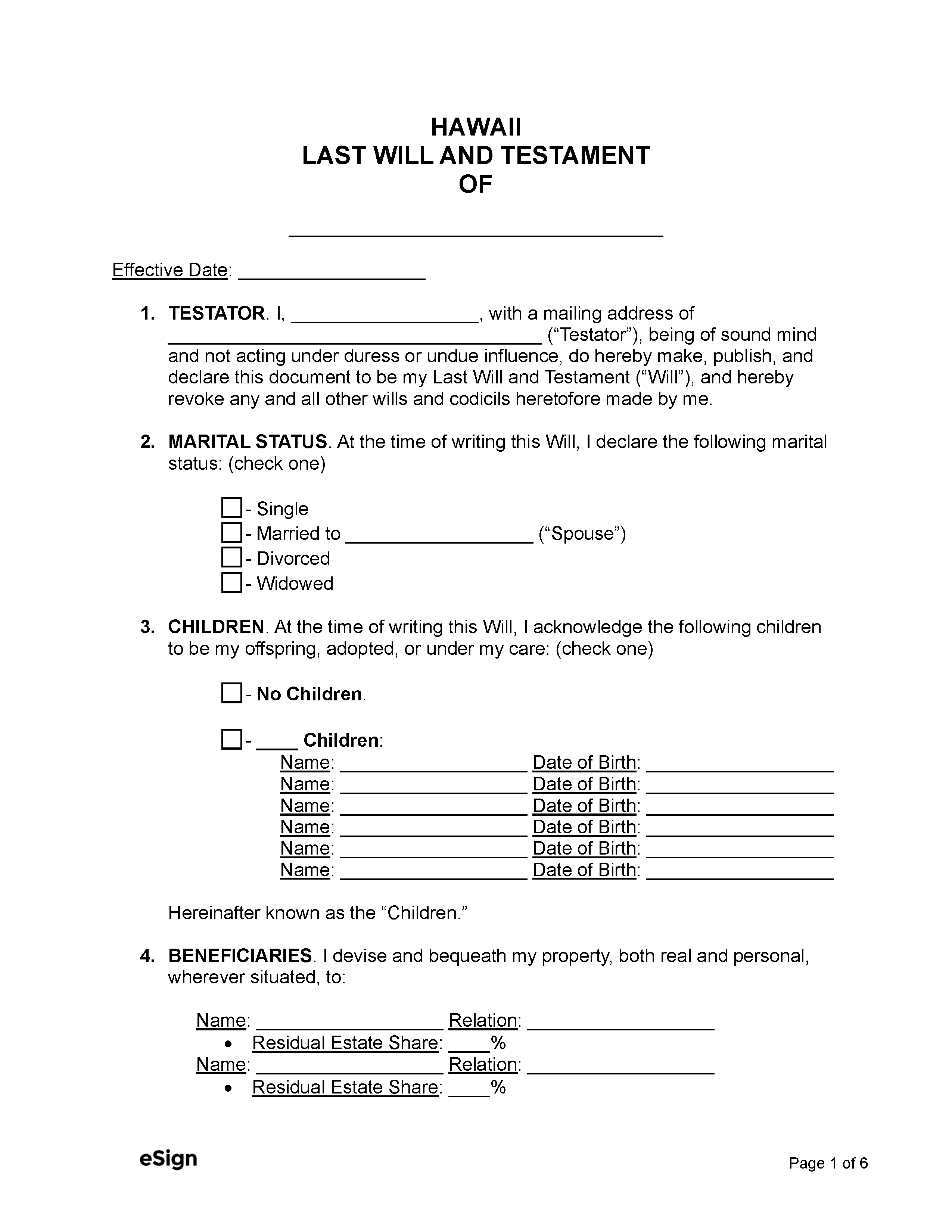State Laws
To make a will, the individual must be at least 18 years old and of sound mind.[1]
Holographic Wills – If the signature and provisions of a will are in the testator’s handwriting, the document is valid whether or not it was witnessed.[2]
Revocation – The maker of a will can revoke it in whole or part by executing a subsequent will or destroying the original document.[3]
Signing Requirements – A will must be signed by two witnesses within a reasonable time after seeing the testator sign the will or acknowledge their signature.
Probate Process in Hawaii (8 steps)
State law requires a will to be admitted to probate within five years of the decedent’s death.[4]
- Opening Informal Probate
- Advance Notice
- Bond (If Applicable)
- Letters Testamentary
- Notice to Creditors & Beneficiaries
- Estate Inventory
- Paying Debts & Filing Tax Returns
- Distribution & Discharge
1. Opening Informal Probate
In Hawaii, probate isn’t required if the deceased owned no real estate and the total value of their personal property is $100,000 or less.[5] To bypass probate and collect the decedent’s property, a legal successor will need to fill out and notarize an Affidavit for Collection of Personal Property of the Decedent.
If probate of the decedent’s will is necessary, most situations allow the will to pass through informal probate, which is conducted through court filings and requires no court appearances. To apply for informal probate, the executor named by the will must complete and file an Application for Informal Probate with the circuit court in the county where the decedent resided.[6] The application requests that the court open informal probate and officially appoint the executor as personal representative for the estate.[7]
The original copy of the will and an Informal Probate Information Sheet must be filed with the petition.
2. Advance Notice
After filing an Application for Informal Probate, the applicant must serve notice of their pending appointment on anyone who filed a Demand for Notice regarding the estate and any other named representatives of the decedent.[8] Any applicable parties must be served a copy of the Application for Informal Probate, a copy of the will, and a notice stating when the court will act on the application.
Notice to Beneficaries
If the applicant is not the parent, spouse, beneficiary, or sibling of the decedent or a corporate fiduciary, notice of the Application for Informal Probate must also be served on the decedent’s named beneficiaries and legal heirs.
Proof of Service
After serving the required notice, the applicant must file proof of service with the circuit court. Proof of service may be a written acknowledgment of service by the party served, an affidavit by the server with return receipts, a certificate of service, or proof of publication.[9]
3. Bond (If Applicable)
If the will or the court requires the executor to post a bond, they must do so before they can get appointed.[10]
4. Letters Testamentary
After receiving the Application for Informal Probate, the court will verify the will’s authenticity and appoint the executor as personal representative for the estate.[11] The executor must make an oath or affirmation that their application is true and execute a statement in acceptance of their appointment. Once these steps have been completed, the court will give the executor Letters Testamentary, which authorize them to administer the estate.[12]
5. Notice to Creditors & Beneficiaries
After receiving Letters Testamentary, the executor will need to serve notice of the informal probate to the decedent’s creditors and beneficiaries. Proof of service must be filed with the court.
Notice to Creditors
The executor must give notice to any of the decedent’s known creditors. The notice gives the creditor 60 days to file a claim if the delivery was by mail. If a notice was published (see below), the creditor has 4 months from the publication date.[13]
The court may also require the executor to notify unknown creditors by publishing notice in a local newspaper once a week for 2 consecutive weeks. Unknown creditors have 4 months from publication to file a claim. If notice isn’t published, unknown creditors must file within 18 months from the decedent’s death date.[14]
Notice to Beneficaries
Within 30 days of informal probate being granted, the decedent’s beneficiaries and legal heirs must be given a notice, which includes the executor’s name and address, the probate’s date and location, and a copy of the will and application (if not already given). Failure to give this notice is a breach of the executors’s duties but does not affect the validity of the probate.
6. Estate Inventory
The executor will need to make an Inventory of the decedent’s property and assets to be prepared for administration. The Inventory may be filed with the court; however, it isn’t required.[15]
7. Paying Debts & Filing Tax Returns
Using estate funds, the executor must pay the decedent’s debts and settle any legitimate claims against the estate. Payments should be made after the period for filing claims has expired, which would be:
- 60 days after service of notice
- 4 months after publication
- 18 months if no publication or service of notice[16]
Tax Returns
The executor will also need to file the decedent’s final federal and state income tax return, as well as the estate income tax return (if the estate earned money after their death). Taxes owed will need to come out of the estate funds.
8. Distribution & Discharge
In most cases, the executor will be required to complete and submit a Closing Statement that summarizes their actions taken during administration and relays the estate’s proposed distribution.[17] If there are any outstanding claims, the statement must also include a description of the arrangements made to satisfy them.[18]
Upon approval of the statement, the executor can distribute the estate’s remaining assets to the beneficiaries, for which they must collect receipts to be filed with the court. One year after a Closing Statement is filed, the executor will be officially discharged from their duties if there are no pending proceedings involving the estate administration.[19]

